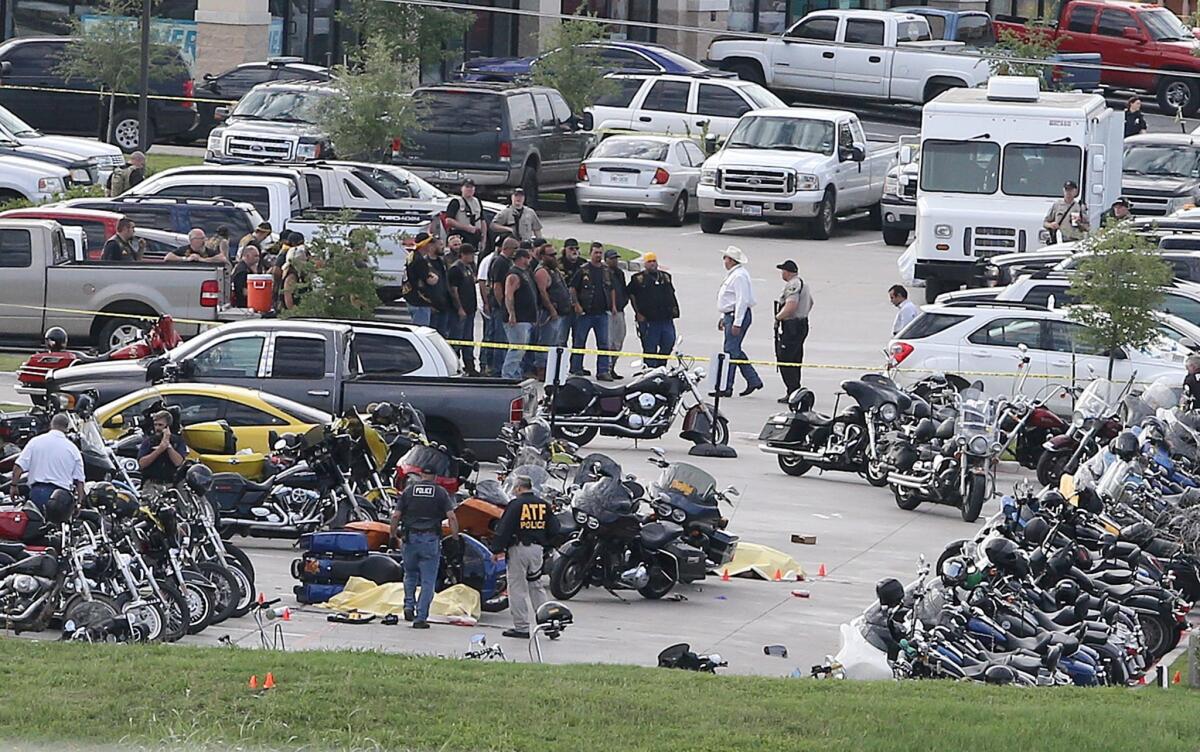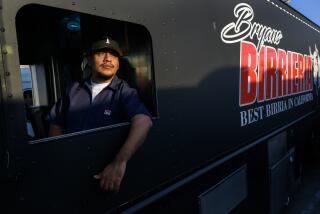With sky-high bail, scores of bikers are still jailed after Texas melee

The biker shooting in Waco, Texas, was on May 17.
After the shooting and stabbings and beatings were over, police began rounding up bikers who had gathered that day at the Twin Peaks restaurant here in central Texas. A fight had erupted between rival motorcycle gangs, police said, and in the end, nine bikers were killed and 18 injured.
Police marched Matthew Clendennen, with scores of other bikers, into the parking lot, where they were flex-cuffed, loaded on a city bus and driven to the convention center for processing, then taken to jail.
Clendennen texted his mother that it might take awhile before he was released. “I knew with the number of people there that it would take a long time. But I was thinking maybe later that night,” he said.
Instead, two days after the May 17 incident, a jail magistrate set bond for him and others at $1 million each.
“It didn’t make any sense,” Clendennen, 30, said Thursday.
Of the 177 people arrested in connection with the violence, 143 remain jailed, many on $1-million bond. Attorneys say it’s unlikely their clients can afford to post bail, and some face a monthlong wait for bond-reduction hearings.
The accused have been arraigned but not formally charged. Under Texas law, a grand jury has 90 days to indict those in custody before they are entitled to reduced bonds.
Clendennen and the other bikers were arrested in connection with organized crime, and the investigation is ongoing, said Waco Police Sgt. W. Patrick Swanton.
“It’s unprecedented, this wholesale roundup of people,” said Clendennen’s Dallas-based attorney, F. Clinton Broden. “It seems like something out of ‘Casablanca’ — just round everybody up. You’re arresting people for being at the scene of a crime. It’s scary that this can happen in America.”
David Kairys, a longtime civil rights lawyer in Philadelphia who successfully challenged police arrest sweeps there, said the Twin Peaks cases raised concerns about rights violations.
“It’s like saying, ‘Let’s arrest them all and sort it out later,’” he said, recalling roundups of communists and socialists in the “red scares” of the 1920s and 1950s and the chilling effect such sweeps have on freedom of speech and association.
“If they just picked people up because they were present at the scene or had membership in some motorcycle groups, that does raise some civil rights issues,” he said.
Broden has filed a complaint with the State Commission on Judicial Conduct against the justice of the peace who set Clendennen’s bond. He also filed a federal civil rights lawsuit against the city of Waco, McLennan County, arresting officers and prosecutors, alleging that his client was wrongfully arrested and detained.
“It’s all wrong,” Clendennen said of his case. “There’s nothing in any of this against me that’s in any way legal. We live in a country where we’re told we have these civil rights.”
Clendennen said he was having lunch with friends on the Twin Peaks patio when shooting erupted. He ducked through a side door into the restaurant.
“From there, I could hear the pop of gunfire, and I took cover until police came into the front of the restaurant and ordered us to the ground,” said Clendennen, a landscaper, father of four and former firefighter from nearby Hewitt who belongs to the Scimitars motorcycle club but does not have a criminal record.
In the complaints, he and his attorney say that McLennan County Justice of the Peace Walter “Pete” Peterson gave bikers $1-million bonds “to send a message,” and that McLennan County Dist. Atty. Abelino “Abel” Reyna created “fill-in-the-blank” arrest warrants that claimed the bikers were not cooperating and therefore were not victims.
Peterson and Reyna made similar comments to The Times after the shootings. Both declined comment Thursday, citing the ongoing investigation.
As for Clendennen’s arrest, Broden said that “there’s got to be individual probable cause. They’ve got the tapes of the scene; there’s no reason they can’t be reviewed to make determinations. You just can’t keep bystanders locked up because you don’t know who did the shooting.”
He noted that bond-reduction hearings, scheduled to begin Friday, stretched until late July.
Clendennen said many of those he was jailed with could not afford to post bail. They are mechanics, road crew and factory workers, some with young families like his.
“You’ve got a bunch of sole providers in there where their whole life is providing for their families. There’s not a lot of people in there with the ability to post, to hand over $10,000 or $25,000 to a bondsman,” he said.
At least 47 of those arrested qualified as indigent and have had attorneys appointed to represent them, according to the local indigent defense coordinator, Cathy Edwards.
Alan Bennett was appointed to represent a grocery store manager and father of four from Midlothian, Texas, who remained jailed Thursday on $1-million bond.
“My client has lost his job, he’s separated from his wife and kids, and there’s no immediate relief in sight for him,” Bennett said. “I tried to negotiate with the district attorney, who informed me he was willing to reduce his bond to $250,000, which is really no different than a million dollars for many of us.”
Bennett said his client, Robert Bucy, 36, is a member of the Cossacks motorcycle club, whose feud with the Bandidos is reported to have sparked the shooting.
This week, Judge Ralph Strother defended local officials’ handling of the cases, saying they could manage the workload and had no plans to bring in additional judges.
He said forcing those jailed to wait until next month for bond-reduction hearings was not unreasonable.
“That’s just part of the process and part of the system,” Strother said. “I liken this to the recent floods that we’ve had: When you have that much water in one place at one time, it takes awhile for things to return to normal.”
Clendennen’s attorney negotiated to have his bond reduced to $100,000, and his family chipped in to bail him out Tuesday, paying $10,000 to a bondsman. Police still have his 2009 Harley.
Clendennen said he immediately returned to work this week before he lost any more landscaping customers, but he wonders about the future.
“Who knows how long this will drag out until I can clear my name?” he asked.
His next court date is Aug. 6.
molly.hennessy-fiske@latimes.com
Twitter: @mollyhf
More to Read
Start your day right
Sign up for Essential California for news, features and recommendations from the L.A. Times and beyond in your inbox six days a week.
You may occasionally receive promotional content from the Los Angeles Times.







